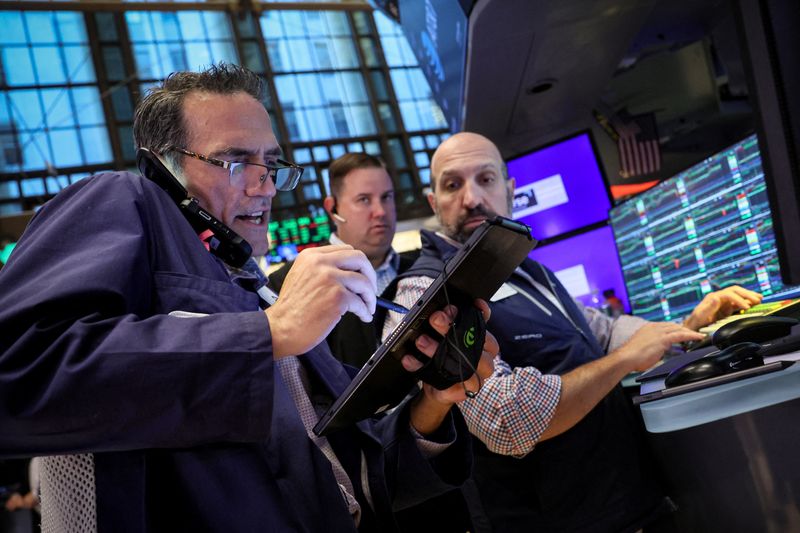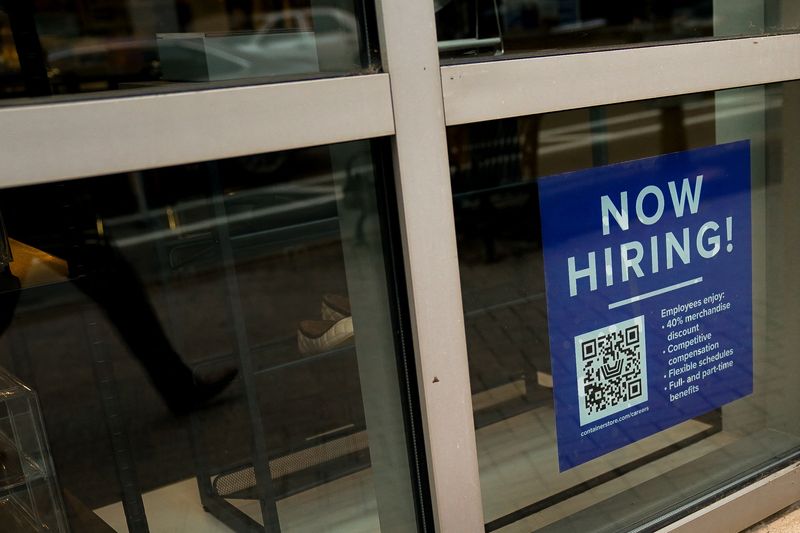By Lawrence Delevingne and Huw Jones
(Reuters) -Global shares idled on Wednesday after a lengthy rebound propelled them towards recent record highs, and as investors awaited confirmation that the U.S. Federal Reserve would cut interest rates as expected.
Fed officials last month were strongly leaning toward an interest-rate cut at their September policy meeting, according to the minutes of the July 30-31 gathering. Fed Chair Jerome Powell is expected to further cement the view that the central bank is about to start loosening credit conditions after taming the worst outbreak of inflation in 40 years when he speaks on Friday at the Fed's Jackson Hole conference in Wyoming.
Oil prices dipped, while dollar weakness on the prospect of rate cuts kept gold near Tuesday's record high.
On Wall Street, the Dow Jones Industrial Average rose 0.13%, to 40,889, the S&P 500 gained 0.42%, to 5,620 and the Nasdaq Composite gained 0.57%, to 17,918.
The MSCI All Country index for global stocks gained 0.4%, standing near its mid-July record high and up 13.9% for the year.
In Europe, the STOXX index of 600 companies was up about 0.3%, also nearing its all-time high, reached on June 7.
Stocks have been on a roller-coaster ride this month after investors took fright following U.S. jobs data that raised the prospect of recession in the world's biggest economy.
Those worries have given way to bets on a soft landing cushioned by cuts in U.S. borrowing costs expected to start in September.
U.S. employers added far fewer jobs than originally reported in the year through March, the Labor Department said on Wednesday, underscoring the growing concerns the Fed has about the health of the labor market.
The labor report "helps underpin the futures market assessment that the Fed will cut rates when it meets on Sept. 18," Quincy Krosby, chief global strategist for LPL Financial (NASDAQ:LPLA), said in an email.
Interest-rate futures have fully priced in a 25-basis-point U.S. rate cut next month, with a one-in-three chance of a 50-bp cut. Almost 100 bps of cuts are priced in for this year, and another 100 bps next year.
U.S. Treasury yields drifted lower. The yield on benchmark U.S. 10-year notes fell 2.3 basis points to 3.795%, from 3.818% late on Tuesday. The 2-year yield, which typically moves in step with interest-rate expectations, fell 6.9 bp to 3.9305%, from 4% late on Tuesday.
A potentially unique situation beckons with material rate cuts without a recession, unlike the backdrop for cutting borrowing costs in five of the past seven cutting cycles, said Ross Yarrow, U.S. equities managing director at investment bank Baird.
"If we get a scenario where the Fed is cutting, inflation is falling and employment continues to rise, it really does start to look like a Goldilocks scenario," Yarrow added.
"So I think the rebound in equities and their prospects from here are actually pretty good."
Markets may still be constrained, said Sameer Samana, senior global market strategist at Wells Fargo Investment Institute.
"We see markets are range-bound until after the November (U.S.) elections," Samana wrote in an email.
STOCKS SLIDE IN ASIA
Earlier in Asia, MSCI's broadest index of Asia-Pacific shares outside Japan fell 0.3%.
Hong Kong's Hang Seng was down 0.7% with JD (NASDAQ:JD).com dropping 8.7% as top shareholder Walmart (NYSE:WMT) moved to sell its large stake.
Japan's Nikkei fell 0.3% as a recovery from its collapse in early August runs into resistance around the 38,000 level.
The falling dollar has spurred gold to record highs and returned the yen to 145.135 per dollar from last month's 38-year trough.
The euro is also up around 3% in August and, at around $1.115, is at its highest since early December. [FRX/]

Gold prices hovered around $2,510 an ounce, near record levels touched on Tuesday.
Oil prices fell again on Wednesday. U.S. crude lost 1.69% to $71.93 a barrel and Brent fell to $76.05 per barrel, down 1.49%.
